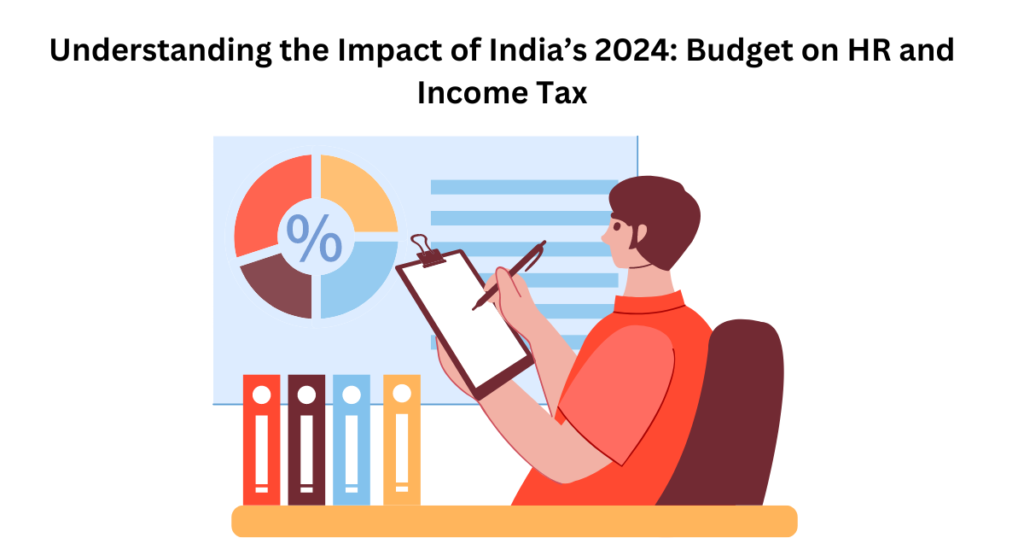- Home
- About Us
- Services
- IT, Digital & technologies
- Non- IT
- Staffing Service
- - Executive Search
- - Project Based Hiring
- - Direct Hire
- - Contract Hiring
- Contingent Staffing
- Outsourcing
- PF ESI Management
- Salary TDS Management
- Labour Compliance Outsourcing
- Compliance Management
Workforce Solution
Payroll & Compliance Management
BGV (Background Verification)
- Solution
- Blog
- Career Zone
- Contact Us
Understanding the Impact of India’s 2024: Budget on HR and Income Tax

Understanding the Impact of India’s 2024 Budget on HR and Income Tax
India’s 2024 Union Budget has introduced several changes that will significantly affect human resources (HR) practices and income tax regulations. These updates are crucial for businesses and employees alike, as they influence tax liabilities and HR strategies. In this blog post, we will break down the key changes and their implications.
Key Changes in Income Tax Slabs
The 2024 Budget has revised income tax slabs to provide relief to taxpayers and to simplify the tax structure. Here’s a detailed look at the new tax slabs for individual taxpayers:
- 0-3 lakh rupees Nil
- 3-7 lakh rupees 5 percent
- 7-10 lakh rupees 10 percent
- 10-12 lakh rupees 15 percent
- 12-15 lakh rupees 20 percent
- Above 15 lakh rupees 30 percent
These revised slabs aim to provide more relief to lower and middle-income groups while maintaining a progressive tax structure. Union Budget 2024-25
Impact on Human Resources
With the new tax regulations, HR departments will need to make several adjustments:
- Revised Payroll Systems: Organizations must update their payroll systems to reflect the new tax slabs and ensure accurate withholding of taxes. This involves recalibrating software and systems to accommodate the changes.
- Compensation Planning: The budget changes may prompt companies to review their compensation strategies. With the introduction of new tax slabs, businesses might need to adjust salary structures to maximize benefits for employees.
- Compliance and Reporting: HR teams will need to stay compliant with the new tax regulations, which includes updating tax deduction policies and reporting procedures. This could involve additional training for HR staff to handle the revised requirements efficiently.
- Employee Communication: Clear communication with employees about how the changes will affect their take-home pay is essential. HR departments should prepare to answer queries and provide guidance on the new tax implications.
Implications for Businesses
For businesses, the new tax slabs could have several implications:
- Cost Management: Adjustments in payroll and tax deductions may affect overall payroll costs. Businesses will need to assess these changes and manage their budgets accordingly.
- Tax Planning: Companies may need to re-evaluate their tax planning strategies to optimize their tax liabilities under the new slabs. This includes potential changes in tax-saving investments and deductions.
- Incentives and Benefits: The revised tax structure may influence the design of employee benefits and incentives. Businesses might need to consider how to align their benefits packages with the new tax regime to enhance employee satisfaction.
- Administrative Adjustments: Updating internal policies and processes to comply with the new tax regulations will require administrative efforts. This includes revising handbooks, updating HRIS systems, and ensuring all documentation is accurate.
Staying Informed and Prepared
To navigate these changes effectively, businesses and individuals should stay informed about the latest developments and seek professional advice if needed. Consulting with tax professionals or financial advisors can provide valuable insights and help in making informed decisions.
For further details on the 2024 Union Budget and its impact, visit the Ministry of Finance’s official website. Staying up-to-date with the latest regulations will ensure that you are well-prepared to adapt to the new tax landscape.

